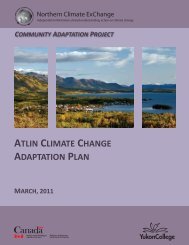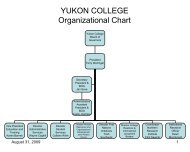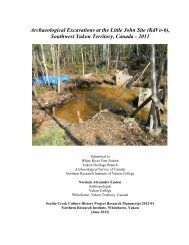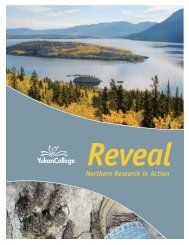Untitled - Yukon College
Untitled - Yukon College
Untitled - Yukon College
You also want an ePaper? Increase the reach of your titles
YUMPU automatically turns print PDFs into web optimized ePapers that Google loves.
Northern Justice<br />
and Criminology<br />
t. 867.668.8770<br />
liberalarts@yukoncollege.yk.ca<br />
Credential: CERTIFICATE<br />
DIPLOMA<br />
Credits: 30/certificate<br />
60/diploma<br />
Duration: 1 yr/certificate<br />
2yrs/diploma<br />
CO-OP: yes<br />
Program Overview<br />
Criminology is the multidisciplinary<br />
study of crime, criminal behaviour and<br />
social reactions to crime and criminal<br />
behaviour. The northern emphasis of<br />
the Northern Justice and Criminology<br />
programs means that southern-based<br />
criminology courses are “northernized”<br />
and “regionalized” through integration<br />
of relevant course content and the<br />
assignment of coursework to better<br />
reflect the environment in which<br />
northerners live, work and study.<br />
The certificate option is designed for<br />
those students who do not intend to<br />
transfer directly to a Bachelor of Arts<br />
(Criminology) degree program but are<br />
interested in taking criminology courses<br />
to increase their knowledge of this field<br />
of study. The diploma is fashioned<br />
to meet the <strong>Yukon</strong> <strong>College</strong> Northern<br />
Studies requirements as well as the<br />
first- and second-year university transfer<br />
requirements to a Bachelor of Arts<br />
(Criminology) degree program at major<br />
Canadian universities. The programs<br />
also present ideal continuing education<br />
opportunities and are useful for those<br />
seeking entry-level employment in justice<br />
and related fields.<br />
Admission Requirements<br />
• grade 12 graduation with English<br />
12 and Math 11 (Applications,<br />
Principles, Foundations, or Pre-<br />
Calculus); OR<br />
• Mature Student Status with<br />
acceptable scores on <strong>College</strong><br />
Assessments, the GED® test or the<br />
Language Proficiency Index (LPI)<br />
test<br />
Required Courses:<br />
Certificate (30 credits)<br />
CRIM 101: Intro to Criminology (3 credits)<br />
CRIM 131: Intro to the Canadian Criminal Justice<br />
System (3 credits)<br />
CRIM 135: Intro to Canadian Law and Legal<br />
Institutions (3 credits)<br />
1 200-Level CRIM Elective (3 credits)<br />
ENGL 100: English Composition (3 credits)<br />
PSYC 100: Intro to Psychology I (3 credits)<br />
SOCI 100: Intro to Sociology (3 credits)<br />
3 Electives (9 credits)<br />
NOTE: Students intending to move on to the<br />
diploma of Northern Justice and Criminology<br />
should complete ENGL 101: Intro to the Study of<br />
Literature and PSYC 101: Intro to Psychology II<br />
to fulfil six of the nine elective credits specified<br />
above.<br />
Other Requirements<br />
Certificate and diploma<br />
• complete at least 50% of the work<br />
at <strong>Yukon</strong> <strong>College</strong><br />
• maintain a cumulative GPA of 2.0<br />
(C average)<br />
Diploma only<br />
• complete a min. 18 credits at the<br />
200 level or above<br />
• complete at least one course in<br />
which land claims or constitutional<br />
development is a significant part of<br />
the curriculum<br />
Transferability<br />
Liberal Arts courses and programs are<br />
transferable to most universities and<br />
colleges in Canada and Alaska, either by<br />
program or on a course-by-course basis.<br />
Students intending to transfer to a<br />
degree program should be aware,<br />
however, that most degree-granting<br />
institutions accept a maximum of<br />
60 transfer credits. As well, some<br />
universities have instituted admissions<br />
limitations to third- and fourthyear<br />
courses. It is STRONGLY<br />
RECOMMENDED that students<br />
consult with their program advisor well<br />
in advance of seeking transfer.<br />
Required Courses:<br />
Diploma (60 credits)<br />
CRIM 101: Intro to Criminology (3 credits)<br />
CRIM 103: Psychological Explanations of Crime and<br />
Deviance (3 credits)<br />
CRIM 104: Sociological Explanations of Crime and<br />
Deviance (3 credits)<br />
CRIM 131: Intro to the Canadian Criminal Justice<br />
System (3 credits)<br />
CRIM 135: Intro to Canadian Law and Legal<br />
Institutions (3 credits)<br />
CRIM 230: Intro to Substantive Criminal Law (3 credits)<br />
2 NOST Core Courses (6 credits)<br />
1 200-Level CRIM Elective (3 credits)<br />
ENGL 100: English Composition (3 credits)<br />
ENGL 101: Intro to the Study of Literature (3 credits)<br />
MATH 105: Introductory Statistics (3 credits)<br />
PHIL 110: Intro to Philosophical Concepts and<br />
Reasoning (3 credits) OR PHIL 120:<br />
Introduction to Ethics (3 credits)<br />
POLI 201: Intro to Political Thought (3 credits)<br />
PSYC 100: Intro to Psychology I (3 credits)<br />
PSYC 101: Intro to Psychology II (3 credits)<br />
SOCI 100: Intro to Sociology (3 credits)<br />
SOCI 227: Research Methods in the Social Sciences<br />
(3 credits)<br />
2 Electives (6 credits)<br />
NOTE: Students may take a CRIM course to fulfil<br />
one of the two electives specified above.<br />
NOST Core Courses<br />
NOST 200: Research in the North (3 credits)<br />
NOST 201: The Natural History of the North<br />
(3 credits)<br />
NOST 202: The Social History of the North (3 credits)<br />
200-Level CRIM Electives<br />
CRIM 210: Law, Youth and Young Offenders (3 credits)<br />
CRIM 213: Women, Crime and Justice (3 credits)<br />
CRIM 219: Aboriginal Peoples and Canadian<br />
Criminal Justice (3 credits)<br />
CRIM 241: Introduction to Corrections (3 credits)<br />
CRIM 251: Introduction to Law Enforcement<br />
(3 credits)<br />
NOTE: Actual course selection must be done in<br />
consultation with a program advisor.<br />
NOTE: Excepting Multimedia Communication and<br />
Visual Arts, all School of Liberal Arts programs<br />
require completion of ENGL 100. Students are<br />
encouraged to take ENGL 100 in their first term of<br />
study. Students can enrol in ENGL 100 if they have<br />
ONE of the following:<br />
• English 12 (min. 80%); OR<br />
• LPI test (min. Level 4 with 24/40 on SS, EU<br />
and RC); OR<br />
• ENGL 090: Bridging English for University<br />
(min. B)<br />
school of liberal arts<br />
<strong>Yukon</strong> <strong>College</strong> 2012/13<br />
www.yukoncollege.yk.ca<br />
Ayamdigut Campus toll free: 1.800.661.0504 Admissions: 867.668.8710<br />
59













